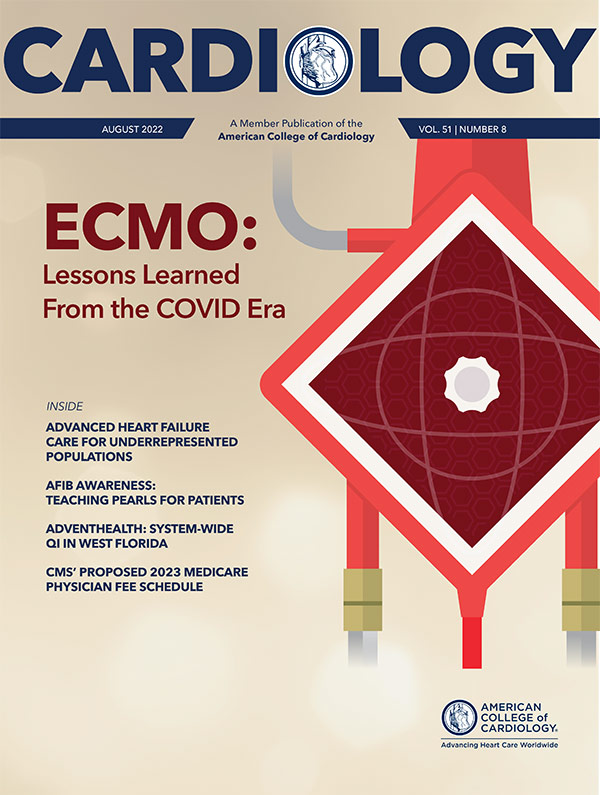Prioritizing Health | A Holistic Approach: Nutrition to Promote Good Mental Health, Prevent Heart Disease

The Centers for Disease Control and Prevention (CDC) estimate that one in five Americans will experience a mental illness in a given year and over 50% will have an encounter with a mental illness or disorder in their lifetime.1 Poor mental health can have an unseen impact on the cardiovascular system – even beyond stress-induced, or takotsubo, cardiomyopathy – leading to an increase in cardiovascular risk and comorbidities downstream.2 Additionally, it has been associated with premature coronary heart disease, regardless of other risk factors such as smoking and family history.3
The association between psychological health and cardiovascular outcomes is highlighted in a scientific statement encouraging a more holistic model for patient care from the American Heart Association. Numerous mind-and-body interventions have now been subjected to rigorous scientific study, including mindfulness-based stress reduction, nutrition interventions, stress management training, cognitive behavior therapy, yoga and more. These interventions harness the mind-body connection and can decrease stress, anxiety and depression or help overcome other unhealthy habits such as smoking, physical inactivity, poor eating and overeating, and poor health-related behaviors, like medication compliance.
Nutrition plays a large role, where the standard American diet, characterized by highly processed, highly refined sugars, processed meat and low fiber, is found to exacerbate or even cause psychiatric symptoms, such as depression and anxiety, while being a known cause of the cardiometabolic syndromes we see in practice.4 Dietary intervention has become increasingly more impactful in primary and secondary prevention of cardiovascular disease. Clinicians should also emphasize to their patients the mind-body connection as a crucial component of preventing and managing cardiovascular disease.2,5
Dietary intervention has become increasingly more impactful in primary and secondary prevention of cardiovascular disease.
Prolonged mental stress can lead to two types of responses: physiological and behavioral. Physiologically, there is increased activation of the sympathetic nervous system, resulting in increased oxygen consumption by the heart, increased vascular tone, elevated blood pressure, hypercoagulation, inflammation and increased oxidative stress activated by the renin angiotensin system. This also results in elevated cortisol levels, causing insulin resistance, impaired glucose tolerance, dyslipidemia and ultimately cardiovascular disease.6 For example, depression has been found to directly increase oxidative stress through the increased production of reactive oxidative species and has been shown in numerous studies to increase the risk of myocardial infarction and re-infarction.2,3 Behavioral responses may include changes in sleep patterns, diet, social engagement, physical activity and medication compliance.2,4-6
Fortunately, now there is a growing evidence base that is better characterizing the effect that poor mental health can have on health outcomes. For example, anxiety affects more than 25% of the population and is associated with increased development of unstable angina, myocardial infarction, ventricular arrhythmia, cardiovascular mortality, heart failure and stroke.7,8 Objective measures of cardiovascular disease, such as ischemic changes on stress testing, were observed in a study of individuals with a diagnosis of post-traumatic stress disorder without any other risk factors for coronary disease.
It's important to note that there is evidence that even a negative outlook, or lack of sense of purpose, is associated with an increased risk of cardiovascular disease and all-cause mortality.2
Poor mental health is associated with poor health-directed behaviors, such as medication compliance, follow-up and lifestyle changes. Screening tools like the Generalized Anxiety Disorder-7 and the PHQ-2, used for anxiety and depression respectively, can be used routinely in the outpatient and inpatient settings to help identify patients who would benefit from treatment, which would also lead to improving their cardiovascular health.2,3
Better Nutrition, Better Outcomes

A Mediterranean diet, rich in whole-grains, vegetables and legumes, low-fat dairy, unsalted nuts, fish and moderate red wine consumption, by its very nature limits or eliminates many of the culprits in the standard American diet.4,9,10 Its higher intake of leafy greens, fruits and nuts increases fiber intake and nutritional diversity, and alters the microbiome in a manner that favors improved mental health and immune system function and dampens oxidative-LDL and inflammation.10-12
Of note, the Dietary Approach to Stop Hypertension (DASH) diet was shown to reduce depression and anger scores among postmenopausal women.4 The DASH also emphasizes eating vegetables, fruits and whole grains, as well as fat-free or low-fat dairy products, fish, poultry, beans, nuts and vegetable oils.
Both of these diets are well-established modalities for nutritional intervention in patients with cardiovascular disease, and have been shown to be beneficial for those with mental health disorders.4,10 By helping patients gain a greater sense of well-being and positive outlook through better nutrition, we're also helping them to improve medication adherence, improve cardiovascular disease outcomes and lower mortality.
Nutrients and Foods to Recommend For a Holistic Approach to Care
- Omega-3 Polyunsaturated Fatty Acids: salmon, chia seeds, walnuts, sardines, mackerel, flaxseeds and flaxseed oils
- Leafy greens: Kale, spinach, dandelion greens, mustard greens, bok choy
- Nuts: Walnuts, almonds, pistachios, pine nuts and brazil nuts; avoid nuts high in saturated fat like macadamia nuts, pecans and cashews
- Probiotics: miso, kimchi, tempeh, yogurt, kefir
- Prebiotics: oats, beans, bananas, berries, garlic, sunchokes
- Cruciferous vegetables (high in antioxidants and fiber): broccoli, cauliflower, brussels sprouts, broccoli sprouts
- Fruits are naturally high in antioxidants and vitamins (B, C, E): strawberries, blueberries, raspberries, kiwis, oranges, lemons, avocados

This article was authored by L. Nedda Dastmalchi, DO, MA, a general cardiology fellow at Temple University Hospital in Philadelphia, PA.
References
- Centers for Disease Control and Prevention. June 28, 2021. About mental health. Accessed July 3, 2022.
- Levine GN, Cohen BE, Commodore-Mensah Y, et al. Psychological health, well-being, and the mind-heart-body connection: A Scientific Statement From the American Heart Association. Circulation 2021;143:e763–e783.
- Gale CR, Batty GD, Osborn DP, et al. Mental disorders across the adult life course and future coronary heart disease: evidence for general susceptibility. Circulation 2014;29:186-93.
- Kris-Etherton PM, Petersen KS, Hibbeln JR, et al. Nutrition and behavioral health disorders: depression and anxiety. Nutrition Reviews 2021;79: 247-60.
- Levine GN. The mind-heart-body connection. Circulation 2019;140:13635.
- Inoue N. Stress and atherosclerotic cardiovascular disease. J Atheroscler Thromb 2014;21(5):391-401.
- Emdin CA, Odutayo A, Wong CX, et al. Meta-analysis of anxiety as a risk factor for cardiovascular disease. Am J Cardiol 2016;118:511-9.
- Celano CM, Daunis DJ, Lokko HN, et al. Anxiety disorders and cardiovascular disease. Curr Psychiatry Rep 2016;18:101.
- Turner JH, Neylan TC, Schiller NB, et al. Objective evidence of myocardial ischemia in patients with posttraumatic stress disorder. Biol Psychiatry 2013;74:861-6.
- Gantenbein KV, Kanaka-Gantenbein C. Mediterranean diet as an antioxidant: The impact on metabolic health and overall wellbeing. Nutrients 2021;13:1951.
- Man AWC, Li H, Xia N. Impact of lifestyles (diet and exercise) on vascular health: Oxidative stress and endothelial function. Oxid Med Cell Long 2020;1496462.
- Owen L, Corfe B. The role of diet and nutrition on mental health and wellbeing. Proc Nutr Soc 2017;76:425-6.
Clinical Topics: Arrhythmias and Clinical EP, Cardiovascular Care Team, Diabetes and Cardiometabolic Disease, Dyslipidemia, Heart Failure and Cardiomyopathies, Prevention, Implantable Devices, SCD/Ventricular Arrhythmias, Atrial Fibrillation/Supraventricular Arrhythmias, Acute Heart Failure, Diet, Exercise, Smoking, Stress, Sleep Apnea
Keywords: ACC Publications, Cardiology Magazine, Cardiovascular Diseases, Hydrocortisone, Blood Pressure, Follow-Up Studies, American Heart Association, Depression, Glucose Intolerance, Inpatients, Insulin Resistance, Mental Health, Metabolic Syndrome, Outpatients, Mindfulness, Patient Health Questionnaire, Renin-Angiotensin System, Sedentary Behavior, Secondary Prevention, Stress Disorders, Post-Traumatic, Yoga, Social Participation, Takotsubo Cardiomyopathy, Risk Factors, Cardiovascular System, Anxiety Disorders, Myocardial Infarction, Stroke, Oxidative Stress, Centers for Disease Control and Prevention, U.S., Sympathetic Nervous System, Health Behavior, Coronary Disease, Medication Adherence, Heart Disease Risk Factors, Exercise, Oxygen Consumption, Angina, Unstable, Outcome Assessment, Health Care, Dyslipidemias, Inflammation, Heart Failure, Infarction, Patient Care, Hyperphagia, Arrhythmias, Cardiac, Anxiety, Smoking, Habits, Sugars, Sleep, Diet
< Back to Listings


